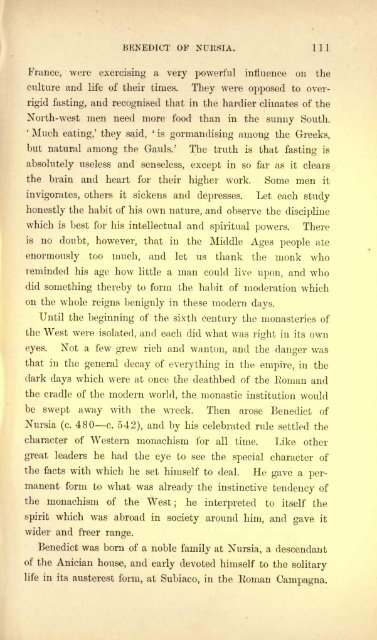Stoics and Saints - College of Stoic Philosophers
Stoics and Saints - College of Stoic Philosophers
Stoics and Saints - College of Stoic Philosophers
Create successful ePaper yourself
Turn your PDF publications into a flip-book with our unique Google optimized e-Paper software.
BENEDICT OF NURSIA.<br />
Ill<br />
France, were exercising a very powerful influence on the<br />
culture <strong>and</strong> life <strong>of</strong> their times. They were opposed<br />
to overrigid<br />
fasting, <strong>and</strong> recognised<br />
that in the hardier climates <strong>of</strong> the<br />
North-west men need more food than in the sunny South.<br />
Much eating, they said, is<br />
gorm<strong>and</strong>ising among the Greeks,<br />
but natural among the Gauls. The truth is that fasting is<br />
absolutely useless <strong>and</strong> senseless, except<br />
the brain <strong>and</strong> heart for their higher<br />
in so far as it clears<br />
work. Some men it<br />
invigorates, others it sickens <strong>and</strong> depresses. Let each study<br />
honestly the habit <strong>of</strong> his own nature, <strong>and</strong> observe the discipline<br />
which is best for his intellectual <strong>and</strong> spiritual powers. There<br />
is no doubt, however, that in the Middle Ages people ate<br />
enormously too much, <strong>and</strong> let us thank the monk who<br />
reminded his age how little a man could live upon, <strong>and</strong> who<br />
did something thereby<br />
to form the habit <strong>of</strong> moderation which<br />
on the whole reigns benignly in these modern days.<br />
Until the beginning <strong>of</strong><br />
the sixth century<br />
the monasteries <strong>of</strong><br />
the West were isolated, <strong>and</strong> each did what was right in its<br />
own<br />
eyes. Not a few grew rich <strong>and</strong> wanton, <strong>and</strong> the danger was<br />
that in the general decay <strong>of</strong> everything in the empire, in the<br />
dark days which were at once the deathbed <strong>of</strong> the Eoman <strong>and</strong><br />
the cradle <strong>of</strong> the modern world, the monastic institution would<br />
be swept away with the wreck. Then arose Benedict <strong>of</strong><br />
Nursia (c. 480 c.<br />
542), <strong>and</strong> by<br />
his celebrated rule settled the<br />
character <strong>of</strong> Western monachism for all time. Like other<br />
great leaders he had the eye to see the special character <strong>of</strong><br />
the facts with which he set himself to deal. He gave a per<br />
manent form to what was already the instinctive tendency <strong>of</strong><br />
the monachism <strong>of</strong> the West<br />
;<br />
he interpreted to itself the<br />
spirit which was abroad in society around him, <strong>and</strong> gave it<br />
wider <strong>and</strong> freer range.<br />
Benedict was born <strong>of</strong> a noble family at Nursia, a descendant<br />
<strong>of</strong> the Anician house, <strong>and</strong> early devoted himself to the solitary<br />
life in its austerest form, at Subiaco, in the Eoman Campagna.

















